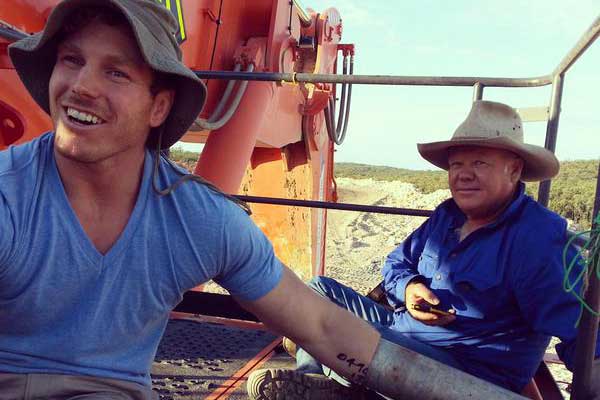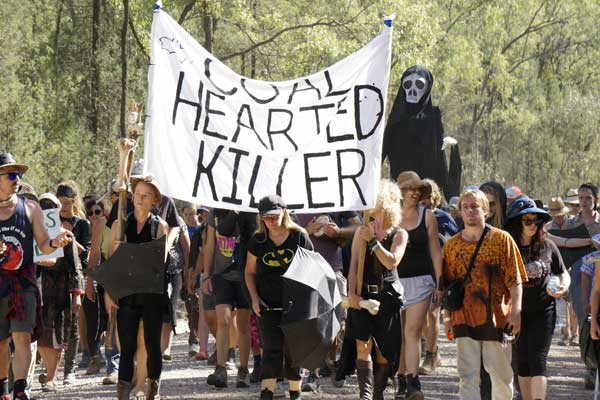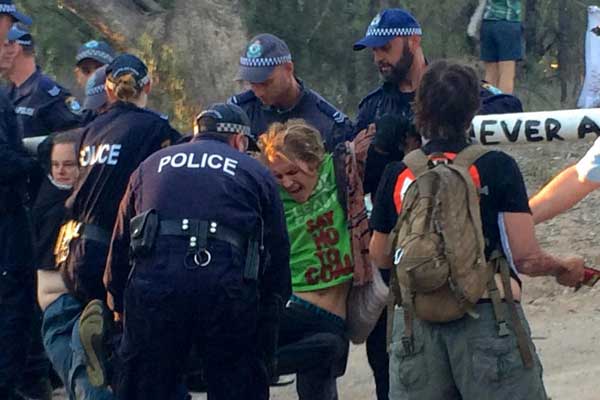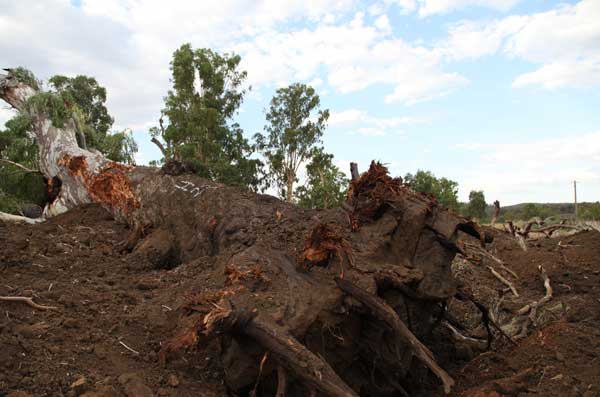‘Extreme’ dissidents are a well-known ingredient in most recipes for social change, and the activists who’ve been cooking up a movement to save the Leard State Forest in north western NSW might just turn out to be the special sauce that will push serious change on fossil fuels into the mainstream consciousness.
The Leard blockade is the first to target a coal mine in Australian history, and the activists who’ve been fighting for over two years to protect the critically endangered forest are about to broaden their campaign.
As Whitehaven Coal’s bulldozers were poised to begin clearing the forest on Sunday, seven protestors ‘locked-on’, joining nearly 350 others who’ve taken similar arrestable action.
Thousands have already visited the blockade camp, which was established in August 2012 to fight Whitehaven’s Maules Creek Mine, and throughout protestors have made canny use of the media to spread their message.
Former Wallabies captain David Pocock created a media storm when he locked onto a bulldozer, and Whitehaven was also home to the infamous ‘ANZ hoax’, when campaigner Johnathan Moylan issued a fake press release on ANZ letterhead announcing the bank was pulling out of the project (and cause a plunge in the company’s stocks).

The Maules Creek Mine, along with Idemitsu Resources’ neighbouring Boggabri Mine, will destroy around half of the Leard State Forest, and lead to the destruction of 12 of the Gomeroi nation’s sacred sites.
The past week has seen 25 fresh arrests which, while they were never going to stop the bulldozers at this late stage, add strength to a poignant message which encourages ordinary people to take action on climate change, and against the destruction of unique ecologies and culture.
It’s a message that has the New South Wales mining lobby, and the government, increasingly worried.
I’ve visited the blockade near Narrabri, around eight hours drive from Sydney, five or six times, trying figure out what drives people to take ‘non-violent direct action’ and how effective those actions ultimately are.
I now call many of the blockaders friends, and as far as I’m concerned they are highly moral people.
One of the most striking aspects of their decision to live, or be arrested at, the blockade, is that there is no personal gain in it for them.
Blockading a coal mine for months or years at a time is not a glamorous job. There’s little comfort in sweltering 45 degree heat, or waiting for the pipes to unfreeze so you can sneak an icy shower. Living out of a tent, and working day and night organising, helping with cooking, maintenance, media or sneaking through the forest to avoid detection, wears people down.
Getting arrested and dragged through the court system isn’t much of a lark either.
Whether you agree with them or not, these activists’ actions are driven by a keen sense of injustice and frustration at a system that allowed Whitehaven Coal’s Maules Creek Mine to go ahead in the first place.
The source of that frustration is a long story. It’s one which involves the dubious dealings of figures at the centre of the Independent Commission Against Corruption’s landmark probe last year. It’s one that involves a criminal investigation into Whitehaven’s key environmental claims, which were later proven to be inaccurate.
In short, Whitehaven Coal’s Maules Creek Mine has more than a whiff of corruption about it, and it’s been described by ecologists as an ‘ecocide’ which will affect 30 endangered species and destroy the largest and most intact stand of critically endangered Box-Gum Woodland, which has been reduced to just 0.1 per cent of its original national extent.
There have been court cases, mass demonstrations, independent ecological reviews (which found as much as 95 per cent error in some cases), petitions, and meetings with government ministers, and as New Matilda revealed last year, phantom environmental oversight.
But none of these efforts have ultimately succeeded in altering or stopping the project.

And it is because of this intractability that many opponents of the mine have come to the conclusion that there is no real mechanism within the system for addressing the threats and injustices that riddle the Maules Creek project, and other large mining operations.
For most of the protestors, Maules Creek Mine is just the tip of the iceberg, which juts out of the murky waters of mining approvals in New South Wales, a state which seemingly cannot say ‘no’ to coal mines.
Since the independent Planning Assessment Commission (PAC) was formed in 2008, only a handful of big coal projects have been rejected. Most of them are now coming around a second time and expected to be approved.
In the words of Southern Cross University law lecturer and environmental activist, Aiden Ricketts, the system only allows for two answers: “‘Yes’ or a qualified ‘yes’”.
The PAC itself described, in 2012, a situation where “in almost all cases” mines had been approved and vulnerable local communities “have either been radically altered in character or become non-viable”.
This system of inevitable approval is what drives people to break the law and take ‘direct action’.
“You start to question things when you see that more than 300 Australians have decided to be arrested over an issue,” Jacqui Maynard, who lived at the blockade camp for four months, said.
“There must be some fairly strong convictions in amongst this because some people have now had multiple arrests.
“And even though some people have bail conditions that say they can’t go anywhere near the mining lease, or even the region, that doesn’t mean they don’t go there.
“When you think about how much risk is involved for each individual, that’s a hell of a thing, y’know?
“It is really a big sacrifice.”
New South Wales Premier Mike Baird has already promised to make that sacrifice greater if re-elected in March.
At a mining lobby dinner in November, Baird vowed to “throw the book” at illegal protestors by introducing legislation that “provides a real deterrent to this unlawful behaviour and protects businesses from illegal protest activity”.
He also promised to make it easier to get mines approved, and halve waiting times.
Given that his government has approved 1.3 billion tonnes of new coal since September last year, the move would likely mean a further expansion of the industry at a time when scientists are telling us we need to be radically slashing our existing production, not increasing it.
These pro-coal plans will require a huge amount of police resources if last Wednesday’s action at the Leard is anything to go by. But judging by the riot squad’s behaviour, Baird’s proposed laws are not something many of them would be keen to enforce.

Sixty cops, equipped with dogs, horses, motorbikes, drones, and quad bikes, were sent to police the 50 protestors who’d occupied Leard Forest Road.
Five protestors had chained their arms together using pipes and created a road block to prevent Whitehaven’s employees accessing the Maules Creek site.
The riot squad were unusually gentle, allowing protestors to obstruct the road for three hours. Some of them even sang and joked with activists, and one officer was reportedly moved to tears when the ‘lock-ons’ were physically removed from the road.
The young activists screamed out in pain as they were moved, with the pipes still locked to both arms, but local resident Ros Druce remained defiant even after the pipes had been removed, and the road cleared.
“You might take our pipes but you’ll never take our forest,” Druce, who lives just kilometres from the mine, declared, brandishing one of the pipes above her head.
But in a grim irony the re-adjustment protestors are now facing up to was scrawled on that very same pipe: “Never again”.
As the last ditch effort to save the Leard went down, activists floated a new message, the start of a broader campaign.
While protestors will continue to converge on the Leard, Murray Drechsler, a founder of the blockade, hinted at the budding movement’s future last Sunday when he addressed the 150 protestors who’d turned out for a ‘funeral procession’ through the forest.
“The movement can’t stop because now the campaign is bigger than the forest,” Drechsler said.
“It goes along the funny theory that if a coal mine is too hard to shut down you shut down the company. And if the coal company is too hard to shut down you shut down the fossil fuel industry.”
“There’s gonna be a home base in Airlie Beach, there’s gonna be a home base in Brisbane, there’s gonna be a home base in Newcastle, Sydney and Melbourne.”
It’s news that probably didn’t reach Mike Baird in Macquarie Street, but if it comes to fruition it will no doubt cause him, and his ex-chief of staff Stephen Galilee, who is now CEO of the New South Wales Minerals Council, considerable angst.
Galilee has described the peaceful protestors at the Leard, amongst a litany of other things, as “excessively violent”, “extremists”, and claimed “it’s only a matter of time before someone is seriously hurt”.
This classic propaganda campaign is what you’d expect from a vested interest group that is seeing its institutional authority undermined by angry citizens who threaten the profits of the fossil fuel industry.
But a growing number of people are realising that the idea that protestors are dangerous or violent is really just a tactic and an excuse that people in power invoke in order to legitimise their actions.
What the protestors’ actions do harm, of course, is the reputation and credibility of people like Baird and Galilee, and their ability to abuse their power in the dark.
At the blockade camp last week, a 21-year-old history student from Melbourne who’d ‘locked-on’ suggested to me that the fight for the Leard might be “our generation’s Franklin River Dam campaign”.

It’s not quite there yet, partly because it lacks serious political support from the major parties.
But if Baird’s and other governments continue to so blatantly ignore the science on climate change and biodiversity, people have shown they will come out fighting, and that more will join them.
Knowing the salt of the Leard protestors, I would expect that fight to continue in spite of Baird’s promised crack down.
Indeed, it is because of the sort of attacks Baird is threatening that protestors take direct action.
“I felt extremely liberated, and supported, in doing something I believed in and taking direct action,” one protestor, who could not be named for legal reasons, told me last week.
“Because we’ve tried everything else and they won’t listen.”
As New South Wales, and Australia, continue to dig themselves, quite literally, into a hole, it may be that people taking direct action is the only way to build the political capital that makes serious action on climate change and biodiversity politically palatable to the major parties.
The protestors at the Leard forest are not criminals, they are ecologists, lawyers, ex-pilots, labourers, academics, footy stars and farmers.
They act out of the conviction our governments so badly lack.
Donate To New Matilda
New Matilda is a small, independent media outlet. We survive through reader contributions, and never losing a lawsuit. If you got something from this article, giving something back helps us to continue speaking truth to power. Every little bit counts.



